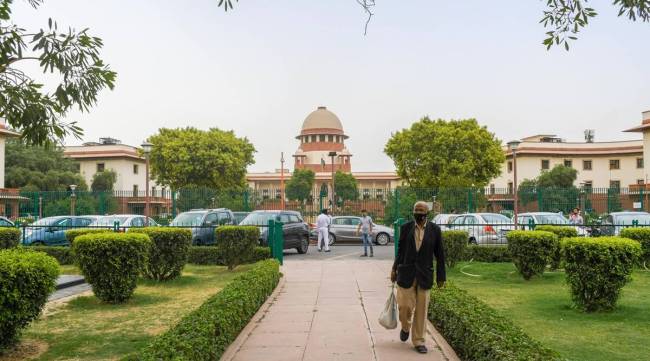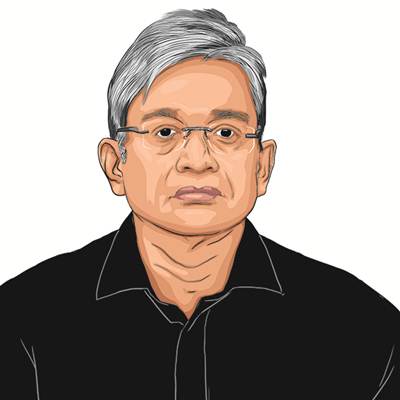Opinion As Supreme Court reviews PMLA, ADM Jabalpur is a cautionary tale
Pallav Shishodia writes: Judicial interpretations shift with time and context. The next shift in PMLA jurisprudence will hopefully be more pro-citizen
 The Supreme Court noted that the spread of PMLA is now too wide to cover the violation of laws regarding copyright, trademark, SEBI, child labour, bonded labour, emigration, passport, environment, air and water pollution, plant protection, antiquities, IT & privacy and cheating and prostitution. (Express Archives)
The Supreme Court noted that the spread of PMLA is now too wide to cover the violation of laws regarding copyright, trademark, SEBI, child labour, bonded labour, emigration, passport, environment, air and water pollution, plant protection, antiquities, IT & privacy and cheating and prostitution. (Express Archives) The Vijay Madanlal (2022) judgment, which held the Prevention of Money Laundering Act (PMLA) as valid law, is open for review/reconsideration in Karti Chidambaram with the extension of interim protection by the Supreme Court on August 25. This is a welcome exercise for some and somewhat baffling for others.
William O’ Douglas, an eminent jurist, author and a “Wild Bill” judge who served on the US Supreme Court for 36 years, recounted in his memoirs how, in the highest constitutional court, the judges first decide issues based on “gut feeling” and then employ rhetoric to justify their decision. While this rhetoric is mostly well researched, brilliantly articulated and finely crafted, it is predominantly an emotional bias that does the trick. These judicial emotions, not to be mistaken for some kind of sinister motives or individual whims, are very complex for lawyers and academicians to unravel. The public can get confounded when these emotions shift like sand.
Recently, in Dobbs, on the right to abortion, the argument that resonated with US Supreme Court against its own 1973 judgment was that “Roe was egregiously wrong from the start.” Its reasoning is “exceptionally weak” with “dangerous consequences” to inflame “debate and deep divisions” in society. The court came to an “inescapable” conclusion that the “right to abortion is not deeply rooted in the nation’s history and traditions”. Nor can it be established in a broader concept of liberty under the 14th Amendment in the guise of “privacy” or “choice and autonomy”. It concluded that the right to abortion cannot be an integral part of “ordered liberty” because while “individuals are free to think and say what they wish” they are “not free to act in accordance with those thoughts”.
One wonders how the most influential court of the most powerful nation on earth was so fundamentally wrong for the last 50 years. Or was it really so?
There are several examples at home and abroad where judicial interpretations have taken diametrically opposite turns to make judicial opinions appear fungible as per time, context and expediency. Or, at times, changes occur due to a clash of ideologies or adherence to higher ideals or simply due to the advent of new ideas.
Back home, in Nikesh Tarachand (2017), the Supreme Court of India gave primacy to life, liberty and fair procedure guaranteed as fundamental rights under our Constitution for grant of bail pending trial to accused arrested for money laundering. It noted that the spread of PMLA is now too wide to cover the violation of laws regarding copyright, trademark, SEBI, child labour, bonded labour, emigration, passport, environment, air and water pollution, plant protection, antiquities, IT & privacy and cheating and prostitution. It cited the example of an offence under the Biological Diversity Act 2002 being treated as a predicate offence to find that alleged money laundering with such acts cannot be considered “so serious” that the accused satisfies the court with the stringent “twin conditions” before pre-trial bail.


It disapproved of the “drastic provision which turns on its head the presumption of innocence which is fundamental to a person accused of any offence”. It cautioned that “we must be doubly sure” before the application of any law that makes drastic inroads into the fundamental right of personal liberty that “there is a compelling state interest in tackling crimes of an extremely heinous nature.” It negated analogies with terror or drug offences under TADA, MCOCA or NDPS. Thus, a “manifestly arbitrary” section 45 of PMLA, insofar as it imposes two further conditions for release on bail during the trial was declared unconstitutional.
In Vijay Madanlal, this decision was reversed to avert the dangers of a “soft state” where there is an “unholy nexus between lawmaker, the law keeper and lawbreaker”. Its major premise is to equate offences of money laundering (irrespective of the nature of the predicate offence) with narcotic drugs and terrorism. It disagreed with “utmost humility” that “the offence of money laundering is less heinous than the offence of terror” and that “there is no compelling state interest in tackling offence of money laundering.” The court disapproved of the notion that “community view(s) economic offender with a permissive eye, although the impact of the offence is way greater than that of the offence of murder.” Despite relatively fewer number of terror cases with a poor conviction rate under PMLA, it reposed trust in the discretion of high-ranking officials. The wider spread of the PMLA to lesser predicate offences is accepted in deference to legislative wisdom. It rejected as a logical corollary other arguments and negated procedural safeguards such as the presumption of innocence, supply of ECIR and inadmissibility of a statement before investigative authorities.
The validity of the PMLA was examined even though as per Rojer Mathew, a larger bench is needed to consider whether the 2019 amendments to the PMLA — including provisions to overcome the earlier judgment in Nikesh Tarachand – could have been passed as a Money Bill. The chasm is widened between proponents of human rights, personal liberties and fair procedure and those betting on a strong executive, more coercive powers to investigative agencies and pervasive police vigil. The critics’ view is that though the ADM Jabalpur was buried six fathoms deep, its avatars float free.
Maybe the next shift in the sands of judicial interpretations turns out more pro-citizen.
The writer is a senior advocate at the Supreme Court of India





